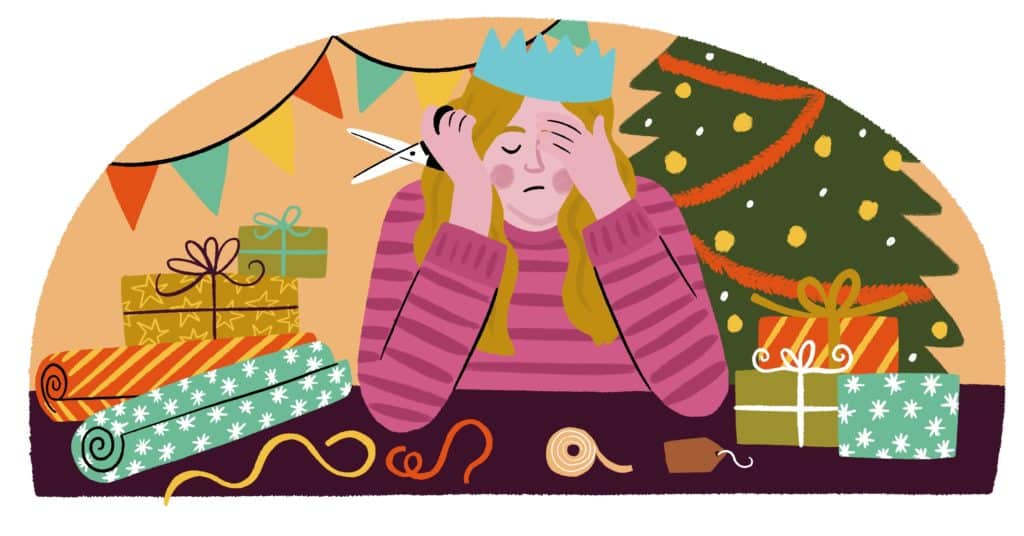
By Mary Fetzer
Clinically reviewed by Dr. Raafia Muhammad, MD, MPH
From Thanksgiving through the New Year, the hustle and bustle of the season are in high gear. For those with ADHD, the stress and excitement surrounding the holidays can be difficult. Experts offer their advice for getting everyone through the busiest time of the year.
“The holidays are a time for family, friends and fun but can be challenging for people with ADHD,” says psychiatrist Jeff Ditzell of New York City, who specializes in adult ADHD and life optimization coaching. “The festive season can have a significant impact on a person’s ability to think clearly and make decisions — and it can bring on feelings of pressure and stress that exacerbate ADHD symptoms.”
The holiday season involves planning, organizing, making lists and remembering important dates — things that can be difficult for people who have ADHD.
“ADHD is associated with challenges involving executive functioning skills, which include working memory, planning and prioritizing, organization, initiating tasks, impulse control and emotional control,” says Danielle Dellaquila, senior associate therapist at Gateway to Solutions, a goal-oriented therapy and counseling practice based in New York City.
The holidays often bring elevated expectations and a “so much to do, so little time” mentality. Women with ADHD, in particular, can be overwhelmed by the many boxes they want to check off, from party planning and decorating to cooking and present-buying. And research finds that women are particularly affected.
Surveys show that women still perform a much larger percentage of household tasks — including around the holidays — than men do. And a 2019 Harvard study in the journal American Sociological Review found that women also do more “cognitive labor” than their male counterparts; that is, they are more mentally involved in daily tasks. Specifically, women report anticipating family needs, figuring out how to fulfill these needs and monitoring their progress. The added tasks that accompany the holiday season only amplify this cognitive burden, particularly for women who have ADHD.
“The addition of visiting family, meal preparation and stimulating social gatherings can make it difficult for women with ADHD to remain focused, set priorities, anticipate changes and manage stress,” Ditzell says. “For this reason, women are more likely to feel isolated and uncertain about how they’re expected to handle situations that arise during this time.”
Even people who have successfully figured out how to manage their ADHD during the rest of the year can feel like they’re not in control when the holiday season arrives. But there are things you can do to make the holidays less stressful and more enjoyable for everyone. Here are some tips:
- Keep Up With Your Daily Routine
Routines are important to the ADHD brain, and it’s important to stick with them even when (especially when) schedules and tasks become intense.
“Maintaining your regular daily routines during hectic times can help you avoid unnecessary stress factors,” Ditzell says.
If you exercise on a regular basis, for example, aim to continue doing so throughout the holiday season. And stick to your regular sleep schedule to help improve focus and energy levels.
- Plan Ahead, Make Lists and Embrace Technology
Ditzell recommends creating a plan to stay on track during the holidays.
“Don’t wait until the last minute to buy a gift, plan a party or book holiday self-care appointments,” he says. “Plan them out so you can find extra time to relax and enjoy the season.”
Dellaquila recommends using calendars and technology to stay on top of holiday plans and dates.
“Set a reminder to discuss holiday plans with loved ones in advance so that you are not scrambling with the stress of last-minute plans,” she says.
Kimberly Vered Shashoua, a therapist at Vered Counseling in North Carolina and Texas, says her biggest tip for surviving the season is to outsource your brain to technology.
“Whether you use an app like ToDoist or rely on a smartwatch to give you notifications, having an external ‘brain’ to keep track of things and to remind you to do things when you need them can be a huge help,” she says.
- Set Small Goals
Dellaquila recommends that instead of baking all the cookies or buying all the gifts you need at once, focus on a few at a time so you don’t become too overwhelmed.
“Do small goals for many of your holiday tasks,” she says. “Instead of aiming to wrap fifty presents in one night, set aside time to wrap five gifts a day for ten days.”
- Establish Boundaries
And if even the small goals are causing stress, take a step back and evaluate the importance of your various holiday tasks. It’s likely that some things really aren’t necessary. No one can do it all, nor should they be expected to do so. One of the most effective things you can do to have a happy and successful holiday season is simply to slow down. That could mean declining an invitation to a holiday party or cutting back on the decorating.
“Think about the responsibilities you hold yourself to during the holidays and decide which are serving you and your family well,” Dellaquila says. “The holidays should be enjoyable: If something is causing you too much stress, then you should not feel guilty about saying no.”
- Take Care of Yourself
It’s easy to get so caught up in the holiday season that you forget to take care of yourself. Be aware of your ADHD symptoms — feeling frazzled or irritable or having difficulty staying focused on tasks — and address them when they start becoming unmanageable.
“While you may have lots of things to do, take some time out of your day for yourself to relax and recharge,” he says. “An enjoyable holiday workout, a visit to the spa or even just a good night’s sleep will help you deal with stressors that come up this time of year.”
- Keep Expectations Reasonable
It’s easy to get caught up in trying to make the holidays perfect, but perfection shouldn’t be the goal.
“The most important thing is that you enjoy the holidays and make memories with the people you love,” Dellaquila says. “Years from now, your kids won’t remember or care that you forgot to make their favorite potatoes or that you didn’t get them matching holiday pajamas. But they will remember if Mom was constantly stressed and in a bad mood during the holidays.”
Try not to sweat the small stuff during the holidays, she adds. “Keep in mind what the holidays are really about,” she says.
- Seek Professional Help
Families tend to spend more time together during the holidays, and family-related issues are common. Ditzell recommends seeking help from a psychiatrist or therapist if your family is experiencing holiday stress.
Resources:
The Guardian: Who Does the Housework?
American Sociological Review: The Cognitive Dimension of Household Labor






